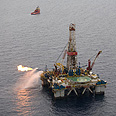
Tamar gas field (archives)
צילום: "אלבטרוס"
Energy exec: Israel could end natural gas imports
US energy company says Tamar gas field – set to become operational in 2012 – will allow Jewish state to meet its own energy needs, potentially even become an exporter of fuel
A US energy company announced Tuesday that a project it is developing off the Israeli coast could soon end the country's longtime dependence on natural gas imports.
Noble Energy Chief Executive Charles D. Davidson said the Tamar gas field – set to become operational in 2012 – will allow Israel to meet its own energy needs, and potentially even become an exporter of fuel.
"Our thoughts are that will exceed what the market will need," Davidson said. "It's significant to Israel and what it can do for this country in terms of lowering energy costs."
Tamar's five wells are each expected to pump 150 million cubic feet of natural gas per day – a pace on par with the Houston company's other wells operating in places like the Gulf of Mexico, he said. The company hopes to open operations in a second Israeli field, called Dalit, at a later time.
The possibility of exporting fuel would mark a dramatic turnaround for Israel, a country in an oil-rich region that is notoriously empty of natural resources and has always relied heavily on fuel imports. The late Prime Minister Golda Meir famously lamented that Moses could have picked somewhere other than "the one spot in the Middle East that has no oil" as a Jewish homeland.
A national supply of natural gas could mean major energy savings for Israeli citizens, as well as revenue for the government from corporate taxes and profit royalties, Davidson said.
'Individual consumers' decision'
Tamar is a significant project for the developers too. When complete, it will account for one-third of Noble's proven reserves, he said. He gave no forecast for profits from the expected $2.5 billion to $3 billion investment.Two wells are already in place in the Tamar field, where Noble announced it discovered significant deep water natural gas deposits in early 2009. The company plans to break ground on additional wells later this year, and is awarding contracts to build undersea pipelines in the coming months.
Despite the rosy outlook, several hurdles remain. Most important, the company is waiting for the government to designate a termination point for the pipeline. Without that, the company won't be able to deliver the gas.
Israeli officials expect demand for natural gas to more than double over the next decade, fueled by economic growth and a shift away from coal – which currently powers about 60% of electricity production. That makes some Israeli officials skeptical that Tamar will produce enough natural gas to meet the country's needs.
Egyptian company East Mediterranean Gas started exporting natural gas to Israel in 2008, under a 20-year agreement at a fixed price. Earlier this week, an Egyptian high court ruled that the company must price the gas to reflect international market rates.
"If the Egyptians provide us with reliable and relatively cheap gas, I can't see how the Israeli market or our ministries would reject it," said Constantine Blyuz, chief economist for the natural gas authority at the Ministry of National Infrastructures. "It's not the government's decision, it's the individual consumers."










